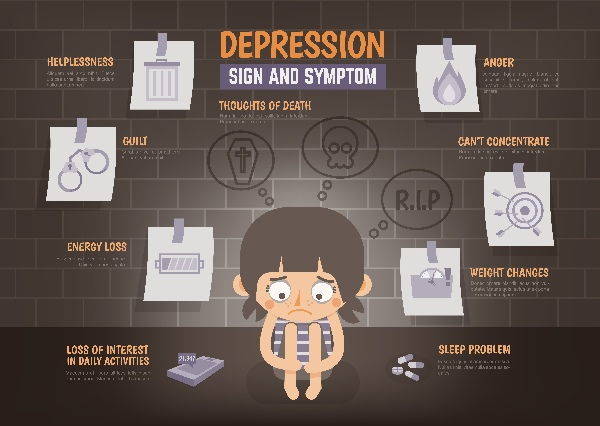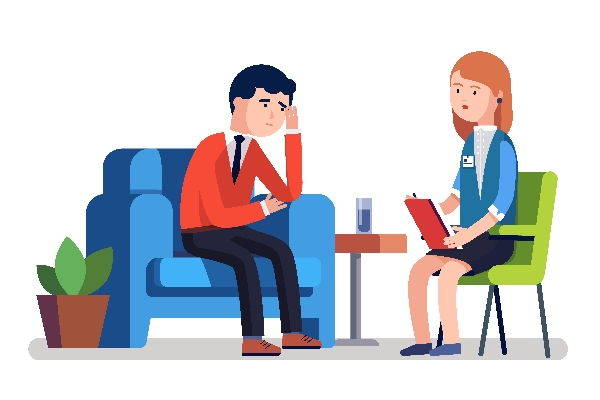How is depression recognized? What are the symptoms and how to deal with it?
Don't store avocado like this: it's dangerousLa trough can be defined as a mood disturbance. More widespread than is thought among the general population (although it affects women more frequently), depression is a condition characterized by great sadness, a sense of hopelessness, loss of motivation, eating and sleeping disorders and from morbid thoughts. But they exist different types of depression? And are there any solutions to get out of it?
Uno depressive state it can last for weeks, months or even years and receives different classifications depending on the intensity of the symptoms. In general, depression affects not only mood, thoughts and behavior, but also the body (a person suffering from depression, for example, may be more vulnerable to colds or infections) and in severe cases it can lead to suicide.
Index
What is Depression
Often, the term "depression" is misused in common parlance for describe the inevitable periods of sadness, of boredom or melancholy that we are all more or less called to go through. For example, being sad after the loss of a relative or blaming a momentary sense of failure in the workplace is normal. But when these moods are repeated daily and for no particular reason or last too long, we can start talking about depression.
READ also: HOW TO FACE THE DIFFICULT MOMENTS OF LIFE
Depression is actually one chronic disease and meets specific diagnostic criteria and when the ability to work, study or have peaceful social relationships is compromised, one is faced with a depressive disorder.
In addition to a strong sense of sadness, a depressed person retains negative and humiliating thoughts: "I'm worth nothing", "He will never do it", "I hate who I am". See you unnecessary and there is no vision of the future or interest in activities that could previously have been thought pleasant.

Depression can occur a any age, including childhood (albeit very rarely), but there are some stages of life most at risk (adolescence), especially those in which strong changes occur that generally imply a readjustment in a new context. Some people may have isolated episodes of depression followed by even years without symptoms, while others have groups of episodes or episodes that become more and more frequent with increasing age.
Finally, depression is one of the most common psychiatric disorders: according to the World Health Organization by 2030, depression will become the second leading cause of disability in the world, after cardiovascular disorders.
Symptoms of Depression
Tanta sadness and inability to feel pleasant emotions. Everything is a problem and one feels inadequate.

I most common symptoms of a depressive state are:
- unhappiness and melancholy, in a depressed child or adolescent, can sometimes be observed irritability more than sadness
- dejection
- inability to feel pleasant emotions
- loss of interest in usual activities
- inability to take initiatives or decisions
- self-guilt, one considers oneself solely responsible for any family problems
- difficulty in concentration and memory
- sleep disorders
- lack of appetite
- loss of sexual desire or pleasure
- gastrointestinal disorders
Symptoms of depression are accompanied by significant distress or one impairment of social and work relationships. In addition, severe depression is often associated with other problems such as i anxiety disorders o drug or alcohol abuse. In fact, many depressed people use these substances to relieve their symptoms, creating - of course - other health problems.
READ also: DEPRESSION: 20 SYMPTOMS AND SIGNS NOT TO UNDERESTIMATE
Depression in children symptoms
Recognizing depression in moles children and in adolescents it is not easy. In children, depression is fortunately quite rare, however, special attention should be paid to any sudden change in behavior and signs of withdrawal, absence, or, conversely, irritability or agitation:
- does not want to play, go out and see his friends
- is very irritable and cries often
- si the Mint headache or stomach ache
- he says he didn't want to be born
- si autoesclude at school
- grows, but takes a low weight
READ also: 8 SECRETS TO GROW HAPPY CHILDREN
Depression in adolescents symptoms
In teens, it can be difficult to distinguish depression from moments of crisis or despair at this stage of life.
The most common signs are:
- abuse of alcohol, drugs, medications
- state of agitation
- verbal abuse
- apparent indifference
- tendency to isolation
- listlessness at school
- signs of self-harm
- verbalization of suicide
READ also: ADDICTION TO VIDEO GAMES, SMARTPHONES AND TABLETS: IT IS ALARM FOR CHILDREN AND ADOLESCENTS
Depression in the elderly symptoms
In older people, among whom depression is also very common, this disorder actually risks going unnoticed because the symptoms (fatigue, loss of motivation, isolation) can be attributed to aging. Some symptoms of depression more common in older than younger are:
- aggression and anger
- unexplained pains, such as the headache
- isolation and withdrawal
- confusion and memory disorders
- feeling useless e suicide
READ also: OMEGA 3 EXTEND THE LIFE OF THE ELDERLY
Causes of Depression
What Triggers Depression? Million dollar question. It is not known exactly what causes depression, but experts agree that it is a complex disease involving many. factors related to heredity, biology, life events, the environment in which one lives and life habits.
Basically, they can be distinguished:
- genetic causes, some long-term studies on families and twins (separated and not at birth) would have shown that the depression has some genetic component, although the specific genes involved have not been identified. Thus, a family history of depression can be a risk factor
- biological causes, some studies have observed in depressed people a deficiency or imbalance of some neurotransmitters such as Serotonin. These imbalances would disrupt communication between neurons. Other problems, such as hormonal imbalance (hypothyroidism, or taking birth control pills) can also contribute to depression
- environment and lifestyle, bad habits (smoking, alcohol, little physical activity, excess of television or video games) and certain living conditions (poor economic conditions, stress, social isolation) profoundly influence the psychological state
- life events, loss of a loved one, divorce, illness, job loss, or other trauma can trigger depression in those predisposed to the disease. Similarly, childhood abuse or trauma makes them more susceptible to depression in adulthood, especially because they permanently disrupt the functioning of certain stress-related genes.
READ also: STRESS: 10 WARNING SIGNS
Types of depression
Based on the course of a depressive disorder, ai symptoms and the relationship with events, different types of depression must be distinguished:
- major depression, which indicates a disorder that is little or not at all influenced by external events (both positive and negative), characterized by fairly severe depressive symptoms that last for a certain period of time
- dysthymia, often affected by external events and there are depressive symptoms similar to those of Major Depression but less severe, more variable and more persistent over time
- unipolar depressions, typical of those patients who, in the course of their life, have had various episodes of the depressive type only
- bipolar depressions, describe those cases in which the course of the disorder was characterized by episodes of both depressive and manic excitement.
Then there is the so-called postpartum depression, however, which usually lasts a few weeks and resolves completely.

Complications
There are several possible complications of depression:
- recidivism, 50% of those who experienced depression
- persistence of symptoms, when depression cannot is completely cured
- transition to chronic depression
- suicide risk, depression is the leading cause of suicide: depressed people consider suicide to stop a pain that seems unbearable
The treatment of depression
The first medical response to a state of depression is: treatment with antidepressants, whose main function is that of re-establish the normal balance between neurotransmitters and receptors (it is clear, in fact, that in depression the symptoms are associated with a reduction of some types of neurotransmitters such as serotonin, noradrenaline, dopamine and a variation in the sensitivity of the corresponding receptors).
But it is still drugs, so it is also and above all of fundamental importance gradually help the depressed person to resume their activities and to undertake cognitive behavioral psychotherapy, the only form of psychological therapy that has ever been effective.
Undertake one psychotherapyin fact, it often helps to understand the meaning of one's depression or, at least, what triggered it. Such therapy also helps to find ways to feel better every day, to respond better to trials, and to seek success.
There are several psychotherapeutic approaches and the Cognitive-behavioral therapy is one of the most effective methods of short-term depression.
READ also: 10 NATURAL REMEDIES FOR DEPRESSION

Similarly, the therapy based on "awareness", the so-called "mindfulness" is a new approach that has proved equally valid. But the effectiveness of the treatment depends, needless to say, also on the personal commitment and willpower of the depressed person, as well as on the relationship of trust that is established with the therapist.
READ also: MINDFULNESS MEDITATION: THE BEST NATURAL ANTIDEPRESSANT
Then there would also be the so-called yogic breathing (or Sudarshan Kriya meditation, which consists of a series of deep breaths that lead to a state of complete relaxation) to have particular anti-depressant benefits, in addition to the more classic meditation.
READ also: COMPLETE YOGIC BREATHING: THE BENEFITS AND HOW TO PRACTICE IT
How to prevent depression
Sometimes, in some cases, it is it is enough to organize a healthier lifestyle for some time, such as going to bed early, exercising more, and eating more balanced (research confirms that the Mediterranean diet alleviates symptoms of everyone's depression).
But much more can help prevent you from sinking into irreversible depression and, in particular, to prevent relapses:
- cultivate relationships
- getting regular exercise
- don't hesitate to open up about what you feel about the people around you
- if necessary, seek the help of a qualified psychologist or psychotherapist
- don't be too hard on yourself
- live in the present moment
- practice meditation
- undertake projects
- recognize and overcome their fears
Germana Carillo


























